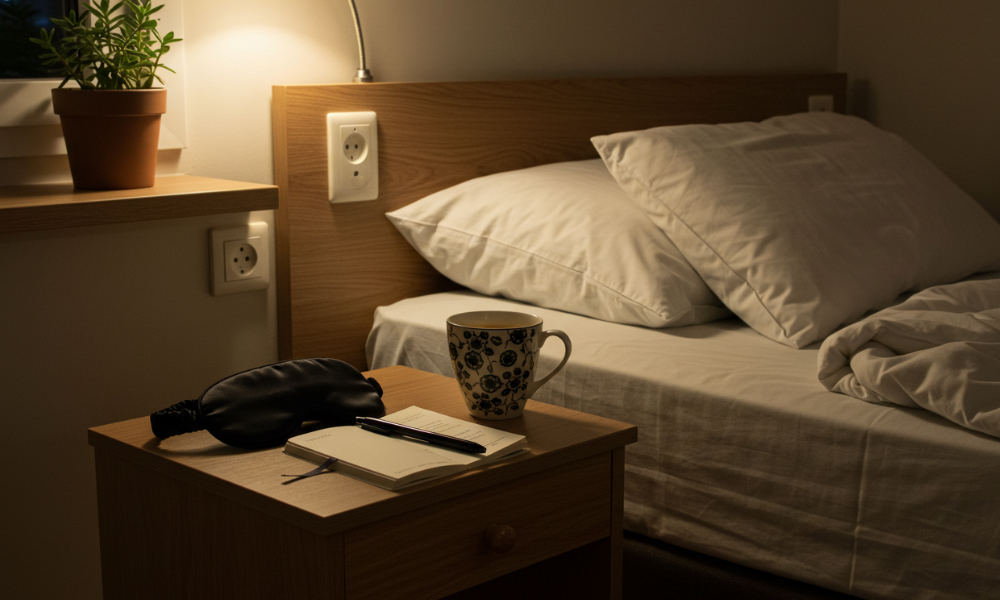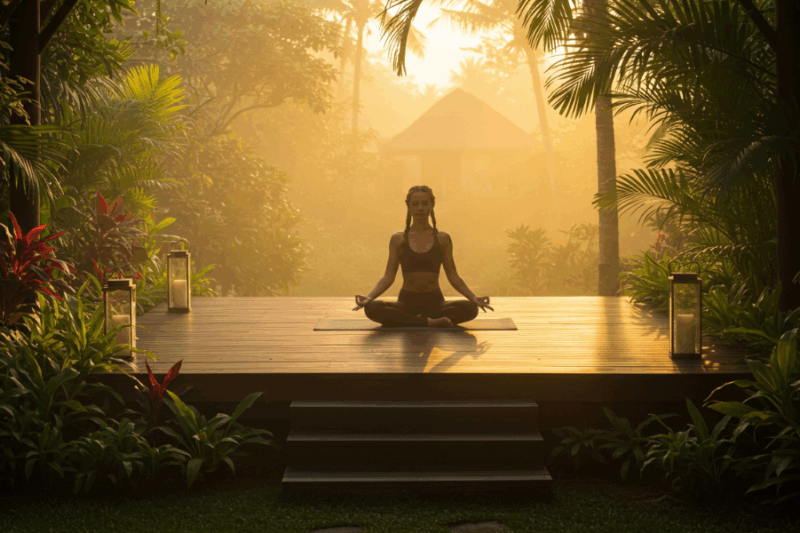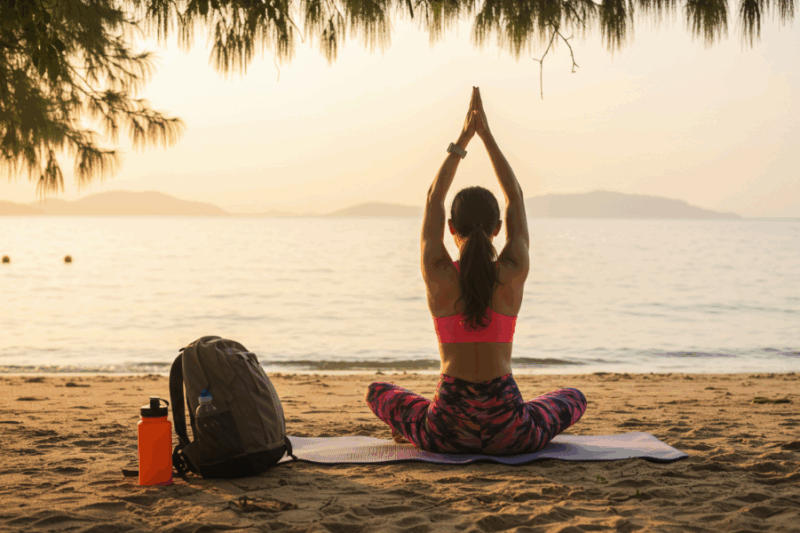Traveling introduces new sights and experiences, but it can disrupt sleep with unfamiliar beds, noisy hostels, or jet lag. For minimalist travelers, a simple evening routine promotes restful sleep without adding bulk to your carry-on, aligning with the ethos of light, intentional travel. These habits, requiring minimal time and gear, help you wind down effectively whether you’re in a Bangkok bunk or a Bali homestay. Here’s a guide to evening rituals that ensure better sleep on the road, keeping your journey refreshed and budget-friendly.

Why Evening Habits Matter for Travelers
Quality sleep is crucial for enjoying travel, boosting energy for exploring markets or temples. Irregular schedules, like late-night buses or time zone shifts, can lead to fatigue. On my Vietnam trip, a 15-minute evening routine helped me sleep soundly in noisy hostels, saving $5–10/day by avoiding pricey private rooms. These habits, taking 10–20 minutes, use minimal tools (phone, earplugs) to maximize rest, keeping your 20–30L backpack light.
1. Limit Screen Time an Hour Before Bed
Blue light from phones or laptops suppresses melatonin, making it harder to fall asleep. In Chiang Mai, I noticed better sleep when I avoided scrolling X before bed. Instead, read a lightweight book (e.g., Kindle app on your phone, free) or journal in a small notebook ($3). If you must use devices, enable night mode or use blue-light-blocking glasses ($5–10). This habit requires no extra gear beyond what’s in your carry-on. How to Do It: Set a phone alarm for 9 PM to stop screen use. Read, journal, or chat with hostel mates. Use night mode if checking maps or apps.
Why It Works: Reduces melatonin disruption, helping you fall asleep faster.
Time: 1 minute to set up, 30–60 minutes screen-free.
2. Practice a Short Relaxation Technique
A 5-minute relaxation practice calms the mind after a busy travel day. In Kyoto, I used deep breathing (4-7-8 method: inhale 4 seconds, hold 7, exhale 8) to unwind after temple-hopping. Alternatively, try progressive muscle relaxation (tense and release each muscle group) or a guided meditation via Insight Timer (free, offline mode). No mat needed—do it on your hostel bed or a scarf ($5) from your pack. How to Do It: Find a quiet spot (bed, hostel corner). Follow a memorized breathing sequence or use an app. Focus on slow, deep breaths.
Why It Works: Lowers stress hormones, easing you into sleep.
Time: 5–7 minutes.
3. Sip a Calming Drink
A warm, non-caffeinated drink signals your body to relax. In Hanoi, I sipped chamomile tea ($0.50–1) from a cafe, which helped me sleep despite jet lag. If hostels lack kettles, buy herbal tea bags ($2–5 for 20) or ask for hot water at local stalls. Avoid coffee, soda, or alcohol after 4 PM, as they disrupt sleep cycles. Carry a reusable water bottle ($15) for sipping tea or plain water to stay hydrated. How to Do It: Buy herbal tea (chamomile, lavender) pre-trip or locally. Request hot water at cafes or hostels. Drink 30–60 minutes before bed.
Why It Works: Warm drinks soothe digestion and promote drowsiness.
Time: 5 minutes.
4. Create a Sleep-Friendly Environment
Hostels or budget hotels can be noisy or bright, but small tweaks improve sleep quality. In Siem Reap, earplugs ($2–5) blocked dorm chatter, and an eye mask ($3–5) dimmed streetlights. Request a lower bunk or quieter room when booking ($5–15/night). If sharing space, use noise-canceling earbuds ($40–80) for white noise via apps like myNoise (free). A lightweight scarf ($5) doubles as a blanket for chilly AC. How to Do It: Pack earplugs, eye mask, and earbuds in your carry-on. Request quiet rooms when checking in. Play white noise if needed.
Why It Works: Blocks distractions, mimicking a familiar sleep setup.
Time: 2 minutes to set up.
5. Light Stretching to Release Tension
A 5-minute stretch session eases physical tension from long bus rides or temple treks. In Bali, I did gentle stretches (child’s pose, seated forward fold) on my hostel floor, using a microfiber towel ($10) as a mat. Focus on neck, shoulders, and hips to relax muscles strained by travel. Avoid vigorous exercise, which can energize you. No extra gear needed—just wear your comfy travel clothes (e.g., quick-dry shorts, $20). How to Do It: Find a small space (bedside, balcony). Follow a simple stretch routine or use apps like Yoga for Beginners (free). Move slowly.
Why It Works: Relieves physical stress, preparing your body for rest.
Time: 5 minutes.
6. Plan the Next Day Briefly
A quick 2–3 minute review of tomorrow’s schedule reduces morning stress, helping you sleep better. In Phnom Penh, I jotted down a market visit and tuk-tuk fare ($2) in a notebook ($3), avoiding late-night worrying. Check offline apps like Maps.me (free) for routes or note key phrases (e.g., “sok sabay” for hello in Khmer). Keep it short to avoid overthinking, focusing on 1–2 priorities. How to Do It: Write 1–2 activities and transport details in a notebook or phone. Save routes offline. Set a morning alarm.
Why It Works: Clears mental clutter, promoting calm before bed.
Time: 2–3 minutes.
Minimalist Travel Tips
- Pack Light: Carry a 20–30L backpack ($50, e.g., Osprey Daylite) with earplugs ($2–5), eye mask ($3–5), microfiber towel ($10), scarf ($5), and notebook ($3). Fits carry-on limits (22x14x9 inches).
- Budget Wisely: Sleep aids cost $10–20 total; tea or street food ($0.50–1) keeps evening expenses at $1–3/day, with total daily costs $15–30 (hostel $5–15, food $5–8).
- Stay Prepared: Download offline apps (Insight Timer, Maps.me, free) and carry a portable charger ($15–30) for device use. Buy tea locally to save space.
- Cultural Respect: Keep noise low in shared spaces (e.g., hostels) and learn local bedtime norms (e.g., early in rural Laos).
- Combat Jet Lag: Align evening routines with local time (e.g., 9–10 PM). Avoid naps longer than 20 minutes during the day.
- Hostel Hacks: Choose dorms with curtains or private rooms ($10–20/night) if noise persists. Check Hostelworld for quiet options.
Why These Habits Work
These evening habits are designed for minimalist travel, taking 10–20 minutes and using lightweight tools (earplugs, phone, scarf) to promote deep sleep. They counter travel disruptions—noise, jet lag, or stress—ensuring you wake up ready for adventure. On my Thailand trip, this routine saved $50/week by sticking to dorms ($5/night) instead of private rooms ($15–20), proving restful sleep doesn’t need luxury. Whether in Tokyo’s capsule hotels or Vientiane’s guesthouses, you’ll rest better.



